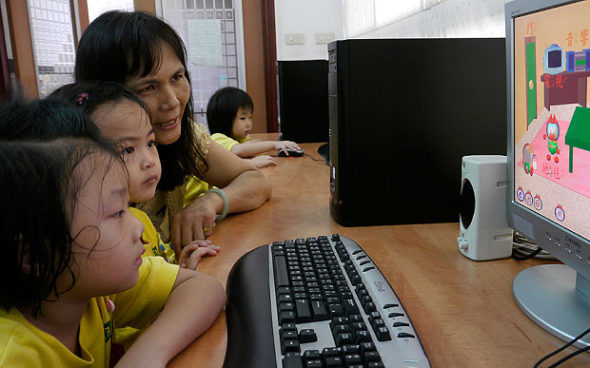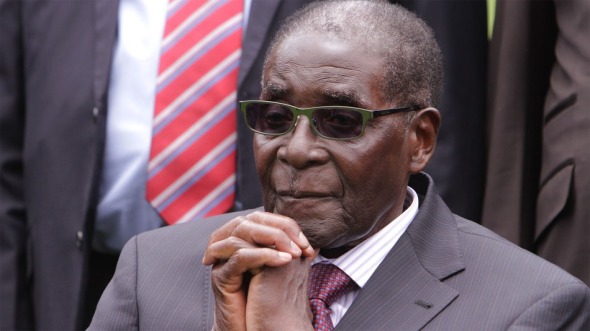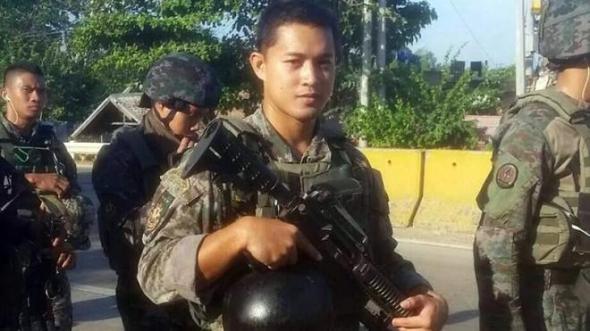redo Jump to...
print Print...

The aim of the legislation is to protect young people by stopping them from using electronic devices for more than 30 minutes at a time (Photo: Sean Sprague/Alamy)
TAIWAN – Government orders parents to limit children’s time with electronic games
Parents in Taiwan are now legally obliged to stop their children from spending too much time using “electronic products” such as video games and televisions.
Under rules passed last Friday [Jan. 23] by Taiwanese politicians, children under the age of two should be completely banned from using electronic devices, Xinhua, China’s official news agency reported.
Meanwhile under-18s should not be allowed to “constantly use electronic products for a period of time that is not reasonable.” It means electronic products are now listed alongside cigarettes and alcohol as potentially dangerous vices.
The new regulation is the brainchild of Lu Shiow-yen, a Taiwanese member of parliament who said his intention was to protect young people by stopping them from using electronic devices for more than 30 minutes at a time.
Parents who break the rules can be hit with fines of up to about £1,000 ($1,503) although it remains unclear how authorities will determine what amount of time is unreasonable.

Taiwan is not the first Asian country to take action against the apparent [dangers] of addiction to the internet and online games.
China, which now has 648 million internet users, at least 24 million young “web junkies” and a rocketing number of internet addiction camps, has spent years trying to devise measures to help goggle-eyed children.
In 2010, Beijing introduced rules requiring games companies “to develop techniques that would limit the gaming time of minors in order to prevent addiction”, according to Xinhua.
Those steps have included penalizing those playing online role-playing games by reducing their characters’ abilities if they play for more than a certain period of time.
In December 2013, Shanghai’s government introduced laws stating that, “parents or other custodians should prevent and stop minors from smoking, drinking alcohol, roaming the streets, or being overindulgent with online and electronic games.”
In the neighboring province of Zhejiang, parents are told to follow guidelines by which they must “instruct and educate minors to correctly choose and use internet material and not to be overindulgent” with their use of such systems.
ZIMBABWE – Robert Mugabe, 90, becomes African Union chairman
Ninety-year-old Zimbabwe President Robert Mugabe, one of Africa’s most divisive figures, ascended to the rotating chairmanship of the African Union (AU) on Friday, January 30, casting a shadow over the continental body’s relations with the West.

Zimbabwe President Robert Mugabe, Africa’s oldest president at 90, took over the rotating post of African Union chairman on Friday.
The only leader Zimbabwe has known since independence from Britain in 1980 assumed the largely ceremonial role when he was handed the AU flag and gavel at a summit in the Ethiopian capital, Addis Ababa.
In his acceptance speech, Mugabe, Africa’s oldest head of state, spoke of the need to guard against foreigners exploiting the continent’s mineral wealth and called for more assistance for African farmers.
“African resources should belong to Africa and to no one else, except to those we invite as friends. Friends we shall have, yes, but imperialists and colonialists no more,” he said, to applause from his peers.
In some corners, Mugabe is feted as a nationalist hero who triumphed over colonial power Britain on the battlefield and at the ballot box, and who remained steadfast in his commitment to the promotion of black African power in the 34 years since.

“Zimbabwe is an important member state, a very committed country,” Algerian Foreign Minister Ramtane Lamamra told Reuters on the sidelines of the summit.
In other corners, however, he is seen as a despotic pariah responsible for human rights abuses, rigged elections and turning one of Africa’s most promising nations [known as the “bread basket” of Africa] into a basket case.
“Mugabe has trashed democracy in Zimbabwe and he and his party have ruined the economy,” said Obert Gutu, a spokesman for the opposition Movement for Democratic Change (MDC) in the Zimbabwean capital Harare. “He lacks the political legitimacy to lead an Africa that should be looking to consolidate democracy and good governance.”
It is a view shared in the European Union and United States, which imposed travel and financial sanctions on Mugabe and his acolytes after election victories over the MDC in 2002 and 2008 marred by violence and charges of vote-rigging and intimidation.
Mugabe denies any wrongdoing.
Some Western nations were “not thrilled” about Mugabe’s appointment, a Western diplomat who follows African affairs said, though adding that it would not disrupt relations with the AU. “We are working with the African Union regardless of the president,” the diplomat added.
As AU chairman, Mugabe can influence topics for debate although other leaders and commissions also frame discussions.
Piers Pigou, southern Africa director for the International Crisis Group think tank, said the continent needed to show it was improving the quality of its democracies, but that it was not only Mugabe who was likely to dodge such questions. “Which African leader, if they were made chairperson of the AU, would stick their neck out and push such an agenda?”
PHILIPPINES – President vows justice for police but warns on anger
Philippine President Benigno Aquino on Friday, January 30 promised justice for 44 policemen killed in a clash with Muslim rebels but, underscoring his calls for the violence not to derail peace efforts, warned against an angry response to the violence.
The government has described the clash on Sunday, which shattered a three-year ceasefire, as a “misencounter” during a bid by police to arrest two wanted militants who had taken refuge with Moro Islamic Liberation Front fighters.

A 2009 photo of one of the 44 policemen killed in a clash with Muslim rebels on Sunday January 25th, 2015.
Aquino has urged legislators not to abandon a plan for an autonomous Muslim region in the south of the mainly Catholic state, the next step in ending the rebels’ 45-year insurgency which has killed 120,000 people.
He told relatives and colleagues of the dead that an inquiry would uncover the truth and determine who was responsible.
“We will do our utmost to gain justice for all those who perished and for the loved ones they left behind,” Aquino said in a eulogy for the dead at a police camp.
But he cautioned against any rash decisions.
“As President, even if I want to be angry, I cannot allow myself to be carried away by my emotions. If I were to let my anger dictate my actions, then perhaps instead of resolving the problem, I would only exacerbate it.”
Aquino said this week he was committed to peace with the rebels and many more people would die if the peace process was derailed.
 Hundreds of policemen demanding justice marched to the police base where Aquino spoke. Retired generals have called for the peace talks to be suspended.
Hundreds of policemen demanding justice marched to the police base where Aquino spoke. Retired generals have called for the peace talks to be suspended.
The rebels have agreed to disband and give up their weapons in exchange for autonomy. They have justified their action against the police as self-defence but said they remained committed to peace.
Earl Parreno, an analyst at Institute for Political and Electoral Reforms, said it was not clear how Aquino could keep his promise for justice and keep the peace. “I really don’t know how the president will exact justice without affecting the peace talks,” he said. “I’m sure the rebels would resist it.”
Aquino said a prayer at each of 44 flag-draped caskets, and met relatives of the dead. He presented families with a medal and promised financial help.
“All I ask right now is justice, not only for my husband, but for everyone who fought and fell,” said widow Erica Pabalinas. “Please, sir president. Please help us.”
(The news briefs above are from wire reports and staff reports posted at London’s Daily Telegraph on Jan. 28 and Reuters on Jan. 30.)
Questions
1. For each of the 3 countries, give the following information:
a) capital
b) location/the countries that share its borders:
c) the religious breakdown of the population:
d) the type of government:
e) the chief of state (and head of government if different) [If monarch or dictator, since what date has he/she ruled? – include name of heir apparent for monarch]:
f) the population:
NOTE: Before answering the questions below, read the info under “Background” and watch the videos under “Resources.”
2. For TAIWAN:
a) list the who, what, where and when of the news item
b) What does the regulation require parents to do specifically?
c) What is the purpose of the newly passed regulation?
d) What is the penalty for violating the new regulation?
e) What do you think: How should such a law be enforced? Should a similar law be passed in the U.S? Explain your answers.
3. For ZIMBABWE:
a) list the who, what, where and when of the news item
b) What are the vision and 3 objectives of the African Union? (see “Background” below)
c) Robert Mugabe has been president of Zimbabwe since 1987. The once-prosperous country has struggled since his administration began seizing white-owned farms in 2000. During his address to the African Union on Friday, Mugabe defended his controversial land reform programs, which he said were “meant for Zimbabweans to assume ownership of land.”
In 2008, President Mugabe’s political party (ZANU-PF) and state security forces staged a “widespread and systematic” crackdown on opponents, which led to the killings of up to 200 opposition supporters and the beating and torture of 5,000 more.
What do you think: Can the African Union effectively carry out its mission with Mr. Mugabe as its chairperson? Explain your answer.
(The outgoing chairman is the president of Mauritania, where at least 20% of the population are slaves.)
4. For PHILIPPINES:
a) list the who, what, where and when of the news item
b) Define autonomous.
c) In the wake of the killing of 44 policemen by Muslim rebels, President Aquino has urged legislators not to abandon a plan for an autonomous Muslim region in the south of the mainly Catholic state, the next step in ending the rebels’ 45-year insurgency which has killed 120,000 people. Which do you think is more important: completing the peace process by giving the rebels an autonomous region, or exacting justice for the 44 policemen who were killed? Explain your answer.
Background
ZIMBABWE –
According to human rights organizations such as Amnesty International and Human Rights Watch the government of Zimbabwe violates the rights to shelter, food, freedom of movement and residence, freedom of assembly and the protection of the law. There are assaults on the media, the political opposition, civil society activists, and human rights defenders. (from wikipedia)
The African Union: The African Union (AU) is a union consisting of 54 African states. The only African state that is not a member is Morocco.
The vision of the African Union is that of: “An integrated, prosperous and peaceful Africa, driven by its own citizens and representing a dynamic force in global arena.”
3 of the African Union’s 14 objectives are:
- To promote peace, security, and stability on the continent.
- To promote democratic principles and institutions, popular participation and good governance.
- To promote and protect human and peoples’ rights in accordance with the African Charter on Human and Peoples’ Rights and other relevant human rights instruments.The most important decisions of the AU are made by the Assembly of the African Union, a semi-annual meeting of the heads of state and government of its member states. The Assembly is chaired by Robert Mugabe, President of Zimbabwe.

Resources
ZIMBABWE: Read about the African Union at the official website: au.int/en/about/vision
PHILIPPINES: The Moro Islamic Liberation Front is considered the country’s largest Muslim rebel group. It was formed in 1981 after its leader, Salamat Hashim, split from the MNLF in 1978. The MILF has had a long-term aim of creating a separate Islamic state in the southern Philippines. (read more at: bbc.com)
ZIMBABWE: Watch a news report from Euronews:
PHILIPPINES: Watch 2 news reports below:
Daily “Answers” emails are provided for Daily News Articles, Tuesday’s World Events and Friday’s News Quiz.



